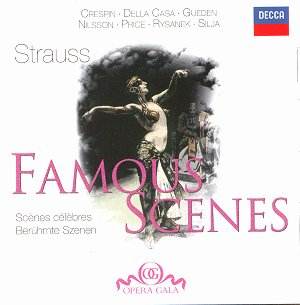Strauss: Famous
Scenes
RICHARD STRAUSS:
Arabella: Aber der Richtige, wenns einen gibt (acko); Ariadne auf
Naxos: Es ist alles vergebens … Es gibt ein Reich (ejo); Elektra:
Allein! Weh, ganz allein (dko); Die Frau ohne Schatten: Sieh -
Amma - sieh … Zum Lebenswasser! … Wehe, mein Mann! (fikl); Der
Rosenkavalier: Mein Gott! Es was nicht mehr als eine Farce (bchkp);
Salome: Dance of the Seven Veils (kn); Closing Scene
(gkm).
 Lisa della Casa (a), Régine
Crespin (b), Hilde Gueden (c), Birgit Nilsson (d), Leontyne Price (e), Leonie
Rysanek (f), Anja Silja (g), Elisabeth Söderström (h) (sopranos),
Vienna State Opera Chorus (i), London Philharmonic Orchestra (j), Vienna
Philharmonic Orchestra (k) conducted by Karl Böhm (l), Christoph von
Dohnányi (m), Herbert von Karajan (n), Sir Georg Solti (o), Silvio
Varviso (p).
Lisa della Casa (a), Régine
Crespin (b), Hilde Gueden (c), Birgit Nilsson (d), Leontyne Price (e), Leonie
Rysanek (f), Anja Silja (g), Elisabeth Söderström (h) (sopranos),
Vienna State Opera Chorus (i), London Philharmonic Orchestra (j), Vienna
Philharmonic Orchestra (k) conducted by Karl Böhm (l), Christoph von
Dohnányi (m), Herbert von Karajan (n), Sir Georg Solti (o), Silvio
Varviso (p).
 Decca 458 250-2 [76'29]
Decca 458 250-2 [76'29]
Crotchet
Midprice

In spite of the extreme demands Strauss made on the human voice he has been
blessed with a long series of classic interpreters. Here are some riches
from the Decca stable; EMI and Deutsche Grammophon could produce an equally
imposing array from their own archives. So the newcomer to Strauss, or the
collector who fancies a few alternative performances to put alongside his
complete sets, need not hesitate; he will get a taste of the composer's principal
operatic scenes in the hands of some of his finest soprano interpreters of
the post-war years, and finely conducted too (the lesser-known Varviso no
less than the others).
Given such overall excellence individual comment is hardly needed, but a
couple of points need making. Good though it is to hear Price's opulent tones,
is she wholly in the part (and was she quite a Straussian soprano in the
way the others are)? It is a little surprising that the Jurinac/Leinsdorf
version was not preferred (which would have had the neat effect of giving
us the VPO all through, not that the LPO's contribution is in any way inferior).
And, while one appreciates Silja's psychological understanding of Salomé's
final scene her gleaming voice can get squally under pressure and occasionally
provides a hostage to those who say this kind of opera is just one big scream
from beginning to end. So here the Nilsson/Solti would have been better,
even if this pair have already given us the Electra extract. The
Böhm Frau is glorious but the 1955 recording becomes strident
as the engineers try to obtain from it a frequency range it just hasn't got;
having allowed the presence of one older recording, what a pity to have nothing
from the Erich Kleiber Rosenkavalier, except that the present version
of the trio from that opera is wonderful and I wouldn't forgo it for anything.
Texts and translations are included, together with a useful note which sets
out the context for each extract.
In conclusion, if you do not know this repertoire yet, get this disc and
start from the Arabella duet. Gorgeous music, gorgeous voices; you'll
be hooked for ever.
Christopher Howell

